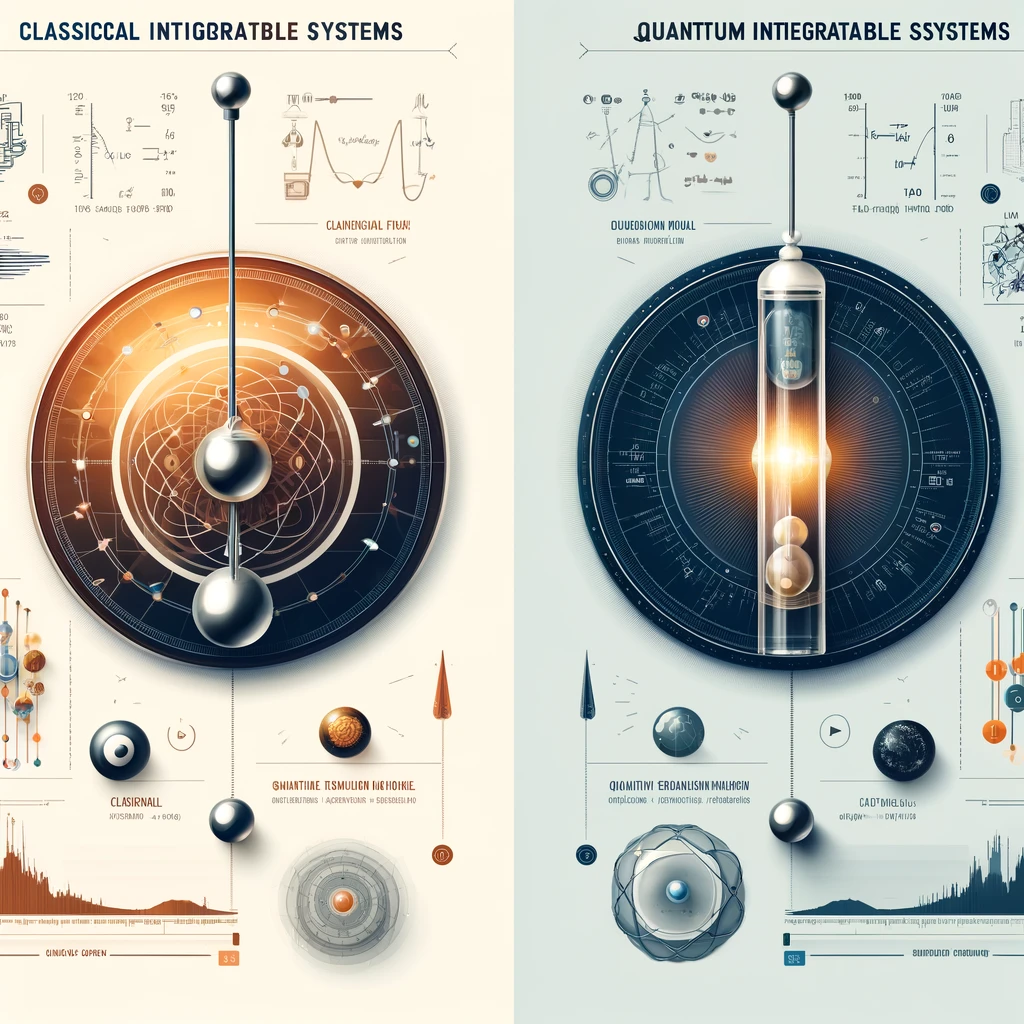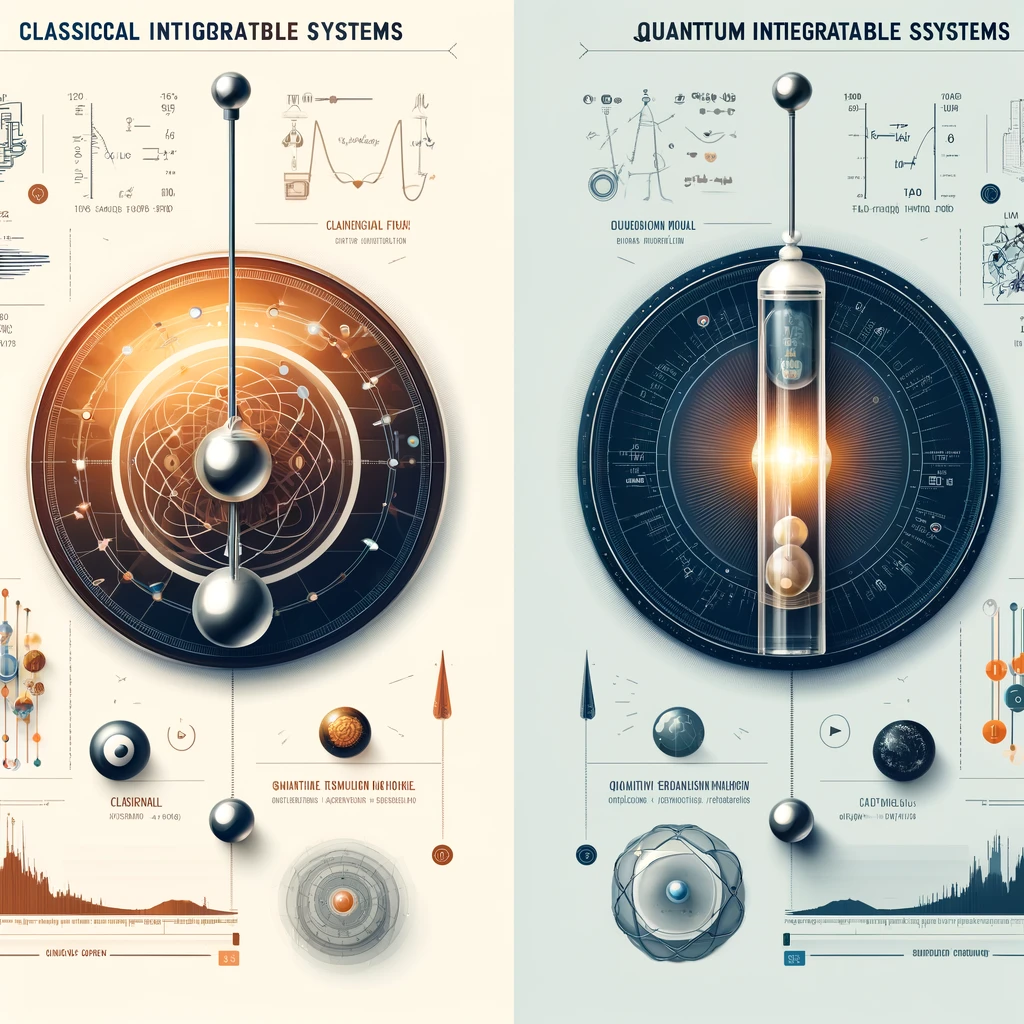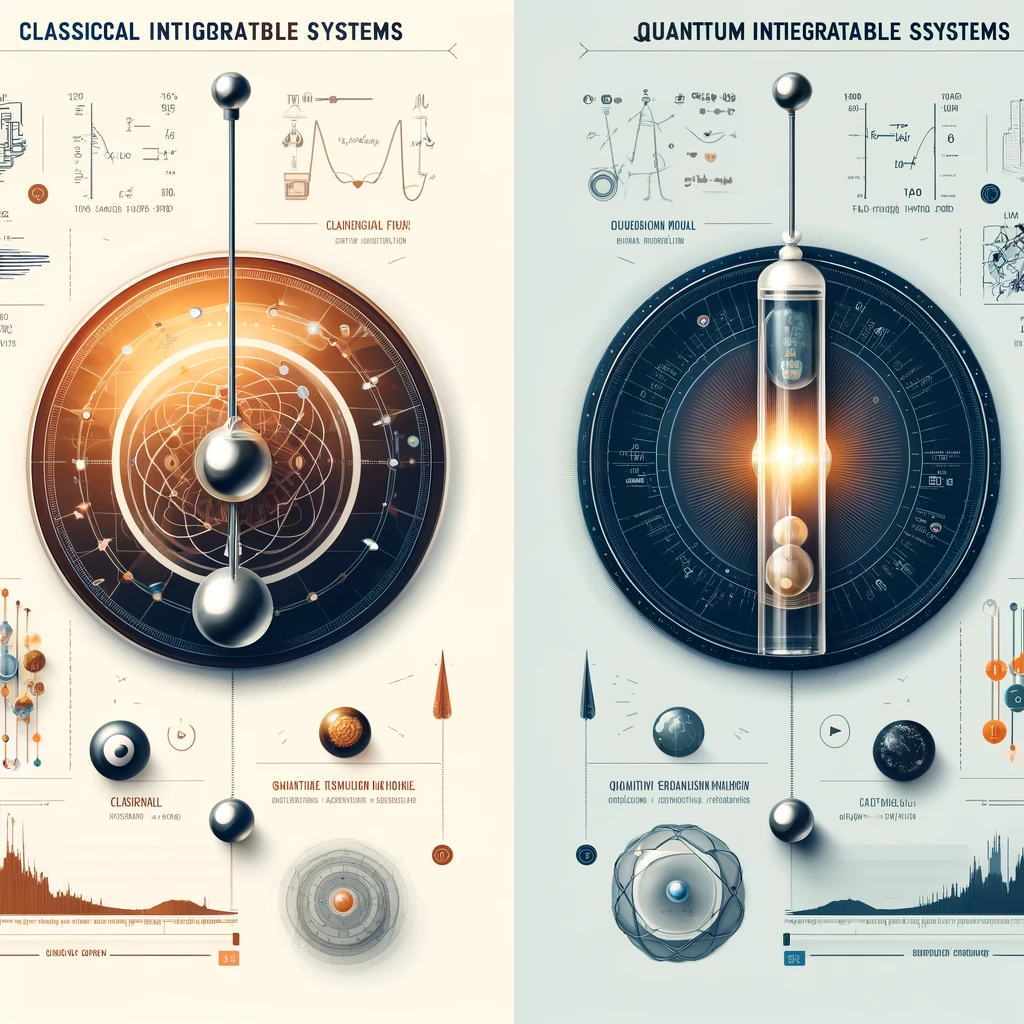Introduction to Classical and Quantum Integrable Systems cite:bimsa.ne Full Guide
Table of Contents
- What are Integrable Systems?
- Classical Integrable Systems
- Quantum Integrable Systems
- Connections Between Classical and Quantum Integrable Systems
- Applications of Integrable Systems
- Key Research and Insights from BIMSA
- Conclusion
What are Integrable Systems?
Integrable systems represent a fascinating area in mathematical physics, characterized by their solvability and structured behavior. They exhibit special properties that allow solutions to be derived exactly rather than numerically. This makes them particularly important for theoretical and applied research.
- Mathematical physics
- Solvable systems
- Exact solutions
- Structured behavior

Classical Integrable Systems
Classical integrable systems are rooted in classical mechanics and describe deterministic systems that can be exactly solved using analytical methods.
Key Features
- Existence of Integrals of Motion:
- Systems have as many conserved quantities as degrees of freedom.
- Liouville Integrability:
- The phase space is foliated into invariant tori.
- Predictability:
- The behavior of the system is fully predictable over time.
Examples
- The Kepler Problem:
- Governs planetary motion; integrable due to conservation laws.
- The Toda Lattice:
- Models particles interacting with exponential forces.
- Korteweg-de Vries (KdV) Equation:
- Describes shallow water waves and is solved via inverse scattering.
This article may contain affiliate links, which means we may earn a commission if you make a purchase or sign up for a service through one of our links. This comes at no additional cost to you and helps support the maintenance and creation of valuable content on this website.
We only recommend products and services that we genuinely believe will bring value to our readers. Our opinions and recommendations are unbiased and based on thorough research and expertise. Thank you for supporting us!
Quantum Integrable Systems
Quantum integrable systems extend the principles of classical integrable systems into the quantum domain. They are essential for understanding phenomena in condensed matter physics, statistical mechanics, and quantum field theory.
Key Concepts
- Commuting Operators:
- Operators correspond to conserved quantities, analogous to classical integrals of motion.
- Bethe Ansatz:
- A method to find exact solutions by reducing complex equations into solvable forms.
- Yang-Baxter Equation:
- Ensures consistency in scattering processes and underpins many quantum systems.
Examples
- Heisenberg Spin Chain:
- A cornerstone model in quantum magnetism.
- Hubbard Model:
- Describes electrons in lattice systems, relevant for superconductivity.
- Quantum KdV Systems:
- Quantum analogs of classical soliton equations.

Connections Between Classical and Quantum Integrable Systems
The link between classical and quantum integrable systems lies in their shared mathematical structure. Classical systems often provide a foundation for understanding their quantum counterparts. For instance:
- Correspondence Principle:
- Classical behavior emerges from quantum systems in the limit of large quantum numbers.
- Symmetries and Algebra:
- Lie algebras and Poisson brackets are key in both domains.
- Quantum-Classical Transition:
- Semi-classical methods bridge the gap between the two systems.
Introduction to Classical and Quantum Integrable Systems cite:bimsa.ne
Applications of Integrable Systems
Integrable systems have wide-ranging applications across physics, mathematics, and even engineering. Here are a few examples:
- Condensed Matter Physics:
- Understanding quantum magnets and superconductivity.
- Statistical Mechanics:
- Analyzing phase transitions and critical phenomena.
- Nonlinear Dynamics:
- Solving problems in fluid dynamics and plasma physics.
- Optical Fibers and Solitons:
- Describing pulse propagation in nonlinear media.
Key Research and Insights from BIMSA
The Beijing Institute of Mathematical Sciences and Applications (BIMSA) has made significant contributions to the study of integrable systems. Key areas of focus include:
- Advanced Mathematical Tools:
- Developing methods for analyzing integrable systems more efficiently.
- Interdisciplinary Research:
- Bridging physics, mathematics, and computational techniques.
- Seminars and Workshops:
- Promoting global collaboration and dissemination of knowledge.

Introduction to Classical and Quantum Integrable Systems cite:bimsa.ne
The Introduction to Classical and Quantum Integrable Systems cite:bimsa.ne offers a rich perspective into one of the most structured and profound areas of mathematical physics. By exploring both classical and quantum domains, researchers uncover deep insights into the laws governing physical systems. Through the ongoing work of institutions like BIMSA, the future of integrable systems continues to unfold with immense potential for theoretical breakthroughs and practical applications.
Also Read:
- Explore the Mathematics of Solitons
- Quantum Field Theory and Integrable Systems
- Learn About Liouville Integrability
Historical Background
The study of integrable systems has its roots in classical mechanics, where scientists sought to understand the motion of celestial bodies and other physical systems governed by deterministic laws. The concept of integrability emerged in the 19th century, with mathematicians like Joseph Liouville and Henri Poincaré making significant contributions.
Quantum integrable systems began to take shape in the 20th century, driven by the advent of quantum mechanics. Physicists such as Werner Heisenberg and Paul Dirac laid the groundwork for quantum systems. Later, the Bethe ansatz, introduced by Hans Bethe in 1931, became a cornerstone in the study of quantum integrable systems. Over time, these systems have evolved into a rich interdisciplinary field, intersecting with mathematics, physics, and computer science.

2. Key Concepts of Classical Integrable Systems
Classical integrable systems are characterized by their ability to be solved exactly, often due to the presence of conserved quantities. Key concepts include:
- Integrability: A system is integrable if it has as many independent conserved quantities as degrees of freedom, allowing it to be solved via analytical methods.
- Liouville’s Theorem: This theorem states that in an integrable system, the motion can be confined to invariant tori in phase space.
- Examples:
- Harmonic Oscillator: A foundational model with conserved energy and predictable motion.
- Kepler Problem: Describes planetary motion, where the angular momentum and energy are conserved.
The classical framework provides powerful insights into deterministic systems and their predictable behavior.
3. Key Concepts of Quantum Integrable Systems
Quantum integrable systems operate under the principles of quantum mechanics. They involve discrete energy levels and operators, contrasting with the continuous nature of classical systems.
- Quantum Operators: Observable quantities like position and momentum are represented as operators, obeying commutation relations.
- Bethe Ansatz: A method to solve one-dimensional quantum systems, crucial for studying spin chains and lattice models.
- Examples:
- Quantum Harmonic Oscillator: A direct analog of its classical counterpart, with quantized energy levels.
- Heisenberg Spin Chain: A model used to explore magnetism and condensed matter systems.
Quantum integrable systems are pivotal in modern physics, particularly in understanding many-body systems.

4. Mathematical Tools and Techniques
Integrable systems rely on sophisticated mathematical frameworks. Key tools include:
- Hamiltonian Systems: The Hamiltonian function governs the evolution of classical systems and serves as the energy function.
- Poisson Brackets: These describe the structure of phase space in classical systems, essential for defining conserved quantities.
- Lie Algebras: In quantum systems, they provide the algebraic structure necessary to study symmetries and conserved quantities.
- Quantum Groups: These generalize classical group theory to quantum contexts, underpinning many integrable models.
The interplay of these mathematical tools facilitates precise modeling and problem-solving.
5. Applications of Integrable Systems
Integrable systems have diverse applications in both classical and quantum domains:
Classical Systems:
- Celestial Mechanics: Understanding planetary motion and orbital dynamics.
- Fluid Dynamics: Solving problems like the Korteweg-de Vries equation for shallow water waves.
- Statistical Mechanics: Modeling phenomena such as phase transitions.
Quantum Systems:
- Condensed Matter Physics: Investigating properties of materials at quantum scales, like superconductors.
- Quantum Field Theory: Addressing problems in particle physics and string theory.
- Quantum Computing: Leveraging integrability for error correction and computation.
These applications highlight the real-world importance of integrable systems.
6. Differences Between Classical and Quantum Integrable Systems
Classical and quantum integrable systems share a foundation but differ in their methodologies and implications:
- Nature of Variables:
- Classical: Continuous variables, such as position and momentum.
- Quantum: Discrete energy levels and operators.
- Mathematical Framework:
- Classical: Governed by differential equations and phase space analysis.
- Quantum: Relies on operator algebra and Hilbert space.
- Applications:
- Classical: Often applies to macroscopic systems like celestial mechanics.
- Quantum: Essential for microscopic phenomena, such as particle interactions.
Understanding these distinctions is vital for selecting appropriate models and methods.

7. Challenges in Studying Integrable Systems
While integrable systems are powerful tools, they come with challenges:
Classical Systems:
- Analytical Complexity: Finding exact solutions is difficult for systems with many degrees of freedom.
- Chaos and Non-Integrability: Many real-world systems are not perfectly integrable, requiring approximations.
Quantum Systems:
- Computational Demands: Solving quantum systems often requires high computational power.
- Entanglement and Correlations: These add layers of complexity, making exact solutions hard to obtain.
Despite these challenges, advancements in computational techniques and mathematical methods continue to push the boundaries.
8. Modern Developments and Open Problems
The field of integrable systems is vibrant, with ongoing research addressing fundamental and applied problems:
- Advances in Soliton Theory: Solitons, or stable wave solutions, are being explored in optics and fluid dynamics.
- Integrable Quantum Systems: Research into non-equilibrium dynamics and quantum entanglement is expanding the field.
- Cross-Disciplinary Applications: Integrable systems are being applied to machine learning, data analysis, and network theory.
- Open Problems:
- Generalizing integrability to higher-dimensional systems.
- Understanding the role of integrability in complex quantum networks.
These developments underscore the dynamic nature of the field.

9. Why Study Integrable Systems?
The study of integrable systems offers several compelling benefits:
- Fundamental Insights: They reveal deep principles of physics and mathematics.
- Predictive Power: Integrable systems often yield exact solutions, providing a benchmark for approximations.
- Cross-Disciplinary Impact: Their applications extend to fields like engineering, computer science, and biology.
- Technological Advancements: Insights from integrable systems contribute to innovations in quantum computing and materials science.
Their relevance spans both academic and practical domains.
10. Resources for Learning More
To delve deeper into classical and quantum integrable systems, consider the following resources:
- Books:
- Mathematical Methods of Classical Mechanics by V.I. Arnold.
- Quantum Mechanics and Path Integrals by R.P. Feynman and A.R. Hibbs.
- Research Papers:
- Explore publications from BIMSA (Beijing Institute of Mathematical Sciences and Applications).
- Read seminal works like Hans Bethe's paper on the Bethe ansatz.
- Online Platforms:
- bimsa.ne: A hub for resources and discussions on integrable systems.
- MOOCs: Platforms like Coursera and edX offer courses on integrable systems and mathematical physics.
These resources provide a solid foundation for beginners and advanced learners alike.

Final Thoughts: Mastering Classical and Quantum Integrable Systems
The study of classical and quantum integrable systems represents the perfect intersection of mathematics, physics, and computational sciences. Whether you're a student, a researcher, or a professional seeking to deepen your understanding of complex systems, mastering this field offers immense intellectual and practical benefits.
From classical mechanics and quantum physics to real-world applications in computing and engineering, integrable systems form the backbone of many modern technologies. By investing your time and resources into learning and leveraging advanced tools, you can elevate your understanding and open new avenues for innovation.
Why Invest in Software and Tools for Integrable Systems?
To truly excel in studying integrable systems, access to cutting-edge software and tools is a game-changer. These technologies help automate computations, visualize complex equations, and simulate real-world applications. Whether you're working on celestial mechanics, solving partial differential equations, or exploring quantum spin chains, the right software simplifies tasks and ensures accuracy.
Top Benefits of Using Specialized Tools
- Enhanced Productivity: Automate complex calculations, saving time and effort.
- Precision and Accuracy: Minimize errors in theoretical and practical work.
- Visualization: Gain intuitive insights through graphical representations of data and systems.
- Efficiency in Research: Quickly test hypotheses and simulate various conditions.
By leveraging tools like MATLAB, Maple, Mathematica, or Python libraries like SymPy, you'll find solutions faster and improve the quality of your work.

Recommended Software and Tools
If you're ready to take your integrable systems journey to the next level, consider investing in these popular tools:
- MATLAB: Ideal for numerical computations, simulations, and visualizations.
- Maple: A powerful platform for symbolic and numerical computations.
- Mathematica: A comprehensive tool for mathematical modeling and visualizations.
- Python Libraries:
- SymPy: For symbolic mathematics.
- SciPy: Useful for numerical integration and optimization.
- QuTiP: Specialized for quantum computing simulations.
- Comsol Multiphysics: A great option for advanced simulations involving integrable systems in engineering.
- Wolfram Alpha Pro: Quick and easy symbolic calculations and step-by-step problem-solving.
These tools empower professionals and students alike to tackle challenging problems efficiently and effectively.
15 Best Courses to Master Integrable Systems
To build expertise and gain a deeper understanding, enrolling in high-quality courses is crucial. Here are 15 of the best courses to guide your journey:
Introductory Courses
- Mathematical Physics (edX): Covers fundamental concepts in classical and quantum physics.
- Introduction to Classical Mechanics (MIT OpenCourseWare): A comprehensive, free resource for classical mechanics.
- Quantum Mechanics for Beginners (Coursera): An introductory course focusing on quantum principles.
- Mathematical Methods in Physics (Khan Academy): Simplifies the complex math behind physical systems.
Intermediate Courses
- Classical Dynamics: Systems and Chaos (edX): Dive into the dynamics of classical systems with chaos theory.
- Quantum Computing and Information (Udemy): Learn the basics of quantum systems and their computational applications.
- Python for Scientific Computing (Udemy): A practical course to use Python in solving integrable systems.
- Symmetry, Groups, and Physics (FutureLearn): A course on algebraic structures in physics.

Advanced Courses
- Hamiltonian Mechanics and Chaos (MIT OpenCourseWare): Advanced topics in classical mechanics.
- Quantum Many-Body Physics (Coursera): Learn about integrable systems in condensed matter physics.
- Nonlinear Dynamics and Chaos (Udemy): Advanced techniques in studying chaotic systems.
- Quantum Field Theory (edX): Dive deep into quantum mechanics and its advanced applications.
Specialized Courses
- Introduction to Solitons and Nonlinear Systems (BIMSA.ne): A unique course focusing on solitons in integrable systems.
- Numerical Methods for Physical Systems (Udemy): Practical numerical techniques for solving complex systems.
- Applied Quantum Mechanics (Udemy): Tailored for engineers and researchers looking for applications of quantum mechanics.
Why Now is the Best Time to Learn
The field of integrable systems is thriving, with applications expanding into quantum computing, machine learning, and material science. By investing in your education now, you’ll gain skills that are in high demand across industries. Moreover, with resources like specialized software and courses, the barriers to entry have never been lower.
Introduction to Classical and Quantum Integrable Systems cite:bimsa.ne
Take the first step toward mastering classical and quantum integrable systems by:
- Choosing the right tools: Invest in the software that best fits your needs.
- Enrolling in top-tier courses: Start with the recommended courses and build your expertise step by step.
- Joining the community: Engage with online platforms like BIMSA to stay updated with the latest developments.
By combining advanced tools and high-quality education, you’ll not only enhance your knowledge but also unlock new opportunities in research, academia, and industry. Start your journey today—because the future of science and technology awaits your contribution!
Love what we do? Keep us going with the cost of a cup of coffee—it’s a small gesture that brews big impact!"
This article may contain affiliate links, which means we may earn a commission if you make a purchase or sign up for a service through one of our links. This comes at no additional cost to you and helps support the maintenance and creation of valuable content on this website.
We only recommend products and services that we genuinely believe will bring value to our readers. Our opinions and recommendations are unbiased and based on thorough research and expertise. Thank you for supporting us!





